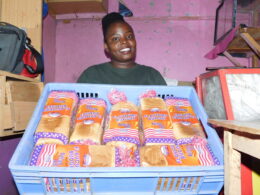Withholding of payments is a common plight facing Migrant domestic workers in Lebanon. The economic crisis coupled with the pandemic and the explosion means that migrant workers are working for months without payments.
15/11/2020
Alice* is a single mother of two. She migrated to Lebanon as a domestic worker in 2019 after a relative approached and introduced her to a recruitment agency which promised a job in Lebanon. It was the first time going out of the country but even with the lack of experience, she was excited to take the risk as she was the breadwinner in her family and lacked employment. She left the children under the care of her parents with the hope that she would be sending money back home every month to support them and ensure the children needs were met.
For four months, she worked without a regular pay but sometimes when she complained, the employer would give her some money.
On arrival in Lebanon, she was received by her employer who was also her sponsor. The family consisted of a husband, wife and two children, the youngest being only one year and eight months. Her responsibilities included mostly cleaning, laundry, ironing, cooking and looking after the children. She was able to get her salary for the first three months, which was sent by her employer to a relative through Western Union. The salary was 250 dollars. However, after three months, her employer stopped paying her, insisting on the country’s bad economic status and the fact that she had spent money to get her to Lebanon.
For four months, she worked without regular pay but sometimes when she complained, the employer would give her some money, not equivalent to her actual salary. She was also not allowed to go out of the house which she says was a strategy to prevent her from running away. Later, she started experiencing health problems but was only given painkillers by her employer. During this period, demonstrations by the Kenyan migrants outside the consulate had intensified. Migrant workers were requesting for repatriation among other demands related to the challenges they had faced in the country. She said that her employer packed her clothes in a polythene paper and dumped her at the consulate where other demonstrators were assembled.
She said that her employer packed her clothes in a polythene paper and dumped her at the consulate where other demonstrators were assembled.
She spent a week sleeping in the streets but luckily a well wisher paid for her ticket back, while another gave her a travelling bag for her belongings.She is now in hers parent’s home and reunited with her children. Even though she was happy to return, she says that she experiences shame and has been mocked by some people in her village who were aware that she had travelled but came back with nothing.
Send Us Home Kenya was able to reach out to her and sent a Ksh6000 stipend and referred her to a counselor. Alice that she was able to the money to buy some chicken poultry as a small investment that could be a source of income. However, one of the biggest challenges has been dealing with chicken diseases.
More stories

This Labour Day there is still a long way to go to protect Kenyan Migrant Workers abroad
Send Us Home Kenya

